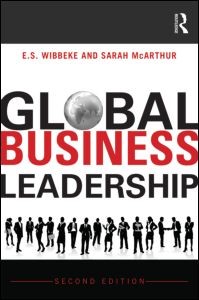

Carol Burbank
E.S. Wibbeke and Sarah McArthur. Global Business Leadership (2nd Edition). NY: Routledge, 2014.
With a foreword by Warren Bennis, this second edition of Global Business Leadership offers a thoughtful look at intercultural leadership in a “flat world,” and the imperative of informed and culturally sensitive leadership responsive to the dynamics of globalization. The authors propose seven points of development determined from their 2005 research study with intercultural leadership specialists. These include: care, communication, consciousness, contrasts, context, change, and capability. Although the book could have benefited from more detailed case studies, the interviews peppered throughout the book offered interesting points of discussion.
Some of the strengths of this book include:
–integrating an interdisciplinary and practical “concept of care” into global business leadership. Care, defined as “ balanced interest and value for profit and stakeholders” (62) is not a personal or specifically relational concept here, but a pragmatic respect for local cultures collaborating in global contexts, with an eye for long-term, sustainable strategies. Care also means “acting from purposeful rather than habitual [approaches]” as a way to connect through intercultural values an ethics, avoiding the trap of short-term economic thinking and “spreading the American way.”(63-85) This concept is a vital challenge to mainstream American business thinking, still mired in culturally-unconscious attention to a narrowly-defined bottome line.
–challenging leaders to become comfortable with ambiguity, their “principle of contrasts” which embraces the powerful, sometimes paradoxical subjectivity of intercultural perceptions and interpretations. The authors propose an “ambiguity aptitude continuum” to measure basic to proficient skills, with basic leadership reflecting tolerance and proficient leadership prospering by “maximizing benefits and lessening effects of risk and uncertainly.”(138-139) This celebration of ambiguity is perhaps the most difficult to develop for leaders, because it requires the willingness to transform personally, organizationally and culturally.
–articulating the power of consciousness and mindfulness in neutral ways to support the development of self-awareness, reflection, curiousity and “situational perspective with no judgment.” (106) Here, the authors offer the role of “sage individual” as a leadership archetype to navigate the diverse roles and situations resulting from “two driving and ostensibly opposing forces: .. globalization and… counter-globalization.”(120) By acknowledging the need for leaders who resist binary thinking, they articulate vital skills, values and qualities for global business today and for the future. I admire their ability to translate spiritual practices into holistic personal development, making a strong case for mindfulness as both grounding and transformation.
This thought-provoking text book would be an interesting addition to a course on global leadership, intercultural communication, or global business development, and might be a useful guide for professionals or organizations working in an intercultural context. I particularly like the metaphor they use for effective intercultural leadership: “leadership agility.” (266) Certainly, any leader who embraces their seven points of development will gain greater flexibility and therefore greater success navigating the challenges of global collaborations and confrontations.
About the Author
Carol Burbank, PhD, is president of Storyweaving Coaching and Consulting, building holistic and creative leadership development programs, supporting individual development and sustainable organizational change. She teaches interdisciplinary approaches to leadership and the humanities, currently in the MA in Engaged Humanities Program at Pacifica Graduate Institute. She has served as faculty at Union Institute and University, and the University of Maryland. She was a senior fellow in the James MacGregor Burns Academy of Leadership at the University of Maryland, College Park. Her leadership research has been published in the collection, The Transforming Leader (ed. by Carol Pearson) and in journals including: Business Leadership Review, ILA(International Leadership Association) publications, Indigenous Issues and Culture. Her current research and explorations of spirited leadership in contemporary times can be found in her blog, Lead Me On (http://leadershipspirit.wordpress.com). Contact information: cburbank@birdsofchange.com

Pingback: Check this out! New Book Review, Global Business Leadership | Lead Me On